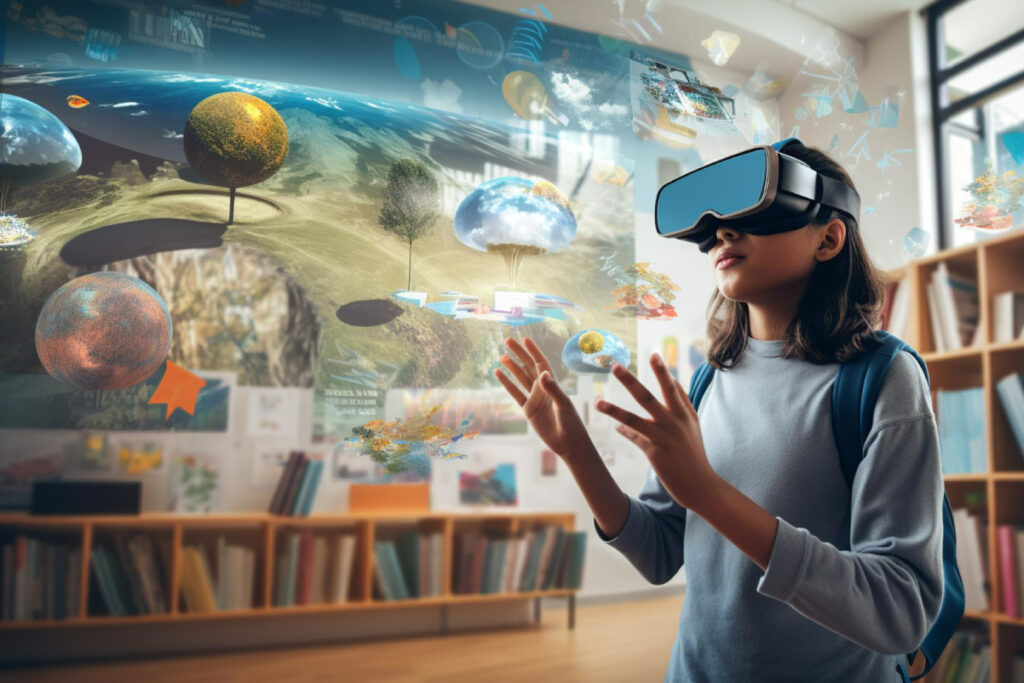Blending Reality and Learning – Unveiling Educational Magic

Dubai, a city known for its futuristic skyline and innovative spirit, is once again at the forefront of embracing cutting-edge technology. This time, it’s in the realm of education, with Extended Reality (XR) taking center stage. XR, an umbrella term that encompasses Virtual Reality (VR), Augmented Reality (AR), and Mixed Reality (MR), is transforming the way students learn and interact with educational content.
A testament to Dubai’s Vision was built recently. Imagine a place where the walls whisper poetry, where the very foundation is etched with the dreams of visionaries. This is Dubai’s Museum of the Future. This architectural masterpiece isn’t just a museum; it’s a journey, which stands as an iconic symbol of what’s possible when vision, technology, and innovation converge.
From VR-powered theme parks to AR-guided city tours, the city has fostered collaborations between tech companies, startups, and creative minds to drive innovation in XR applications. By harnessing the power of XR for education, Dubai is not just crafting digital realities but shaping the future of global education. According to statistics, Consumer spending on XR is expected to reach 40 billion Dollars by 2023 globally.
UAE has also launched its metaverse tech strategy, positioning itself as a leader in the XR economy. This evident showcases how the revolutionization in education has become more evident.
Recently, the Ministry of Health of the United Arab Emirates (UAE) also announced the world’s first Healthcare Metaverse platform, promoting user services in healthcare through the digital environment.
Lets talk about how this technology is making waves in Dubai’s educational sector, and why should universities jump on board?
XR in Dubai’s Education
Dubai’s educational institutions have always been keen on integrating the latest technological advancements into their curriculum. XR is no exception. With the ability to create immersive learning environments, XR offers students a unique opportunity to engage with subjects in a more interactive and hands-on manner. The possibilities are endless.
Moreover, the global pandemic has further accelerated the adoption of digital tools in education. With remote learning becoming the norm, XR provides a solution to the challenges of keeping students engaged and motivated. It bridges the gap between traditional classroom learning and the digital world, offering a hybrid model that caters to the needs of today’s tech-savvy generation.
While the benefits of XR in education are evident, it’s crucial for universities to understand the significance of this technology.
Here’s why:
Universities adopting OneX are witnessing a paradigm shift. Lecture halls are transforming into vast landscapes of exploration. Students are no longer passive recipients of knowledge; they’re adventurers, explorers, and innovators.
Enhanced Engagement: XR offers an immersive learning experience, making subjects more engaging and interactive. This can be particularly beneficial for complex topics that require visualization.
Practical Experience: For subjects like medicine, architecture, or engineering, XR can simulate real-world scenarios, allowing students to practice and hone their skills in a risk-free environment.
Global Collaboration: With XR, students in Dubai can collaborate on projects with peers from around the world, fostering a global perspective and enhancing cross-cultural understanding.
Future-Proofing: As the world becomes increasingly digital, universities that integrate XR into their curriculum will be better positioned to attract tech-savvy students and meet the demands of the future job market.
In Conclusion
The rise of XR in education in Dubai is not just a fleeting trend; it’s the future of learning. As the lines between the physical and digital worlds blur, XR offers a unique opportunity to enhance the learning experience, making it more engaging, interactive, and relevant. Universities in Dubai and around the world should recognize the potential of this technology and collaborate with pioneers like OneOrigin to shape the future of education.



